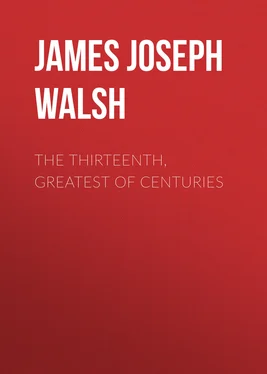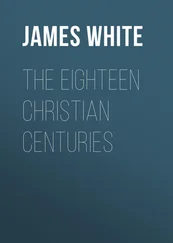James Walsh - The Thirteenth, Greatest of Centuries
Здесь есть возможность читать онлайн «James Walsh - The Thirteenth, Greatest of Centuries» — ознакомительный отрывок электронной книги совершенно бесплатно, а после прочтения отрывка купить полную версию. В некоторых случаях можно слушать аудио, скачать через торрент в формате fb2 и присутствует краткое содержание. Жанр: foreign_prose, История, foreign_edu, foreign_antique, на английском языке. Описание произведения, (предисловие) а так же отзывы посетителей доступны на портале библиотеки ЛибКат.
- Название:The Thirteenth, Greatest of Centuries
- Автор:
- Жанр:
- Год:неизвестен
- ISBN:нет данных
- Рейтинг книги:3 / 5. Голосов: 1
-
Избранное:Добавить в избранное
- Отзывы:
-
Ваша оценка:
- 60
- 1
- 2
- 3
- 4
- 5
The Thirteenth, Greatest of Centuries: краткое содержание, описание и аннотация
Предлагаем к чтению аннотацию, описание, краткое содержание или предисловие (зависит от того, что написал сам автор книги «The Thirteenth, Greatest of Centuries»). Если вы не нашли необходимую информацию о книге — напишите в комментариях, мы постараемся отыскать её.
The Thirteenth, Greatest of Centuries — читать онлайн ознакомительный отрывок
Ниже представлен текст книги, разбитый по страницам. Система сохранения места последней прочитанной страницы, позволяет с удобством читать онлайн бесплатно книгу «The Thirteenth, Greatest of Centuries», без необходимости каждый раз заново искать на чём Вы остановились. Поставьте закладку, и сможете в любой момент перейти на страницу, на которой закончили чтение.
Интервал:
Закладка:
In spite of such evidence it is generally conceded that to accept these large numbers would be almost surely a mistake. There were without any doubt many thousands of students at the Thirteenth Century universities. There were certainly more students at the University of Paris in the last quarter of the Thirteenth Century than there were at any time during the Nineteenth Century. This of itself is enough to startle modern complacency out of most of its ridiculous self-sufficiency. There can be scarcely a doubt that the University of Bologna at the time of its largest attendance had more students than any university of modern times, proud as we may be (and deservedly) of our immense institutions of learning. With regard to the English universities the presence of very large numbers is much more doubtful. Making every allowance, however, there can be no hesitation in saying that Oxford had during the last quarter of the Thirteenth Century a larger number than ever afterwards within her walls and that Cambridge, though never so numerous as her rival, had a like good fortune. Professor Laurie of Edinburgh, a very conservative authority and one not likely to concede too much to the Middle Ages in anything, would allow, as we shall see, some ten thousand students to Oxford. Others have claimed more than half that number for Cambridge as the lowest possible estimate. Even if it be conceded, as has sometimes been urged, that all those in service in the universities were also counted as students, these numbers would not be reduced very materially and it must not be forgotten that, in those days of enthusiastic striving after education, young men were perfectly willing to take up even the onerous duties of personal services to others, in order to have the opportunity to be closely in touch with a great educational institution and to receive even a moderate amount of benefit from its educational system. In our own time there are many students who are working their way through the universities, and in the Thirteenth Century when the spirit of independence was much less developed, and when any stigma that attached to personal service was much less felt than it is at the present time, there were many more examples of this earnest striving for intellectual development.
If we discuss the situation in English-speaking countries as regards the comparative attendance at the universities in the Thirteenth Century and in our own time, we shall be able to get a reasonably good idea of what must be thought in this matter. The authorities are neither difficult of consultation nor distant, and comparatively much more is known about the population of England at this time than about most of the continental countries. England was under a single ruler, while the geographical divisions that we now know by the name of France, Spain, Italy and Germany were the seats of several rulers at least and sometimes of many, a circumstance which does not favor our obtaining an adequate idea of the populations.
That but two universities provided all the opportunities for whatever higher education there was in England at this time, would of itself seem to stamp the era as backward in educational matters. A little consideration of the comparative number of students with reference to the population of the country who were thus given the opportunity for higher education—and took advantage of it—at that time and the present, will show the unreasonableness of such an opinion. It is not so easy as might be imagined to determine just what was the population even of England in the Thirteenth Century. During Elizabeth's reign there were, according to the census, an estimate made about the time of the great Armada, altogether some four millions of people. Froude, accepts this estimate as representing very well the actual number of the population. Certainly there were not more than five millions at the end of the Sixteenth Century. Lingard, who for this purpose must be considered as a thoroughly conservative authority, estimates that there were not much more than two millions of people in England at the end of the Twelfth Century. This is probably not an underestimate. At the end of the Thirteenth Century there were not many more than two millions and a half of people in the country. At the very outside there were, let us say, three millions. Out of this meagre population, ten thousand students were, on the most conservative estimate, taking advantage of the opportunities for the higher education that were provided for them at the universities.
At the present moment, though we pride ourselves on the numbers in attendance at our universities, and though the world's population is so much more numerous and the means of transportation so much more easy, we have very few universities as large as these of the Thirteenth Century. No American university at the present moment has as large a number of students as had Oxford at the end of the Thirteenth Century, and of course none of them compares at all with Paris or Bologna in this respect. Even the European universities, as we have suggested, fall behind their former glory from this standpoint. In the attendance to the number of population the comparison is even more startling for those who have not thought at all of the Middle Ages as a time of wonderful educational facilities and opportunities. In the greater City of New York as we begin the Twentieth Century there are perhaps fifteen thousand students in attendance at educational institutions which have university privileges. I may say that this is a very liberal allowance. At universities in the ordinary sense of the word there are not more than ten thousand students and the remainder is added in order surely to include all those who may be considered as doing undergraduate work in colleges and schools of various kinds. Of these fifteen thousand at least one-fourth come from outside of the greater city, and there are some who think that even one-third would not be too large a number to calculate as not being drawn directly from our own population. Connecticut and New Jersey furnish large numbers of students and then, besides, the post-graduate schools of the universities have very large numbers in attendance even from distant states and foreign countries.
It will be within the bounds of truth, then, to say, that there are between ten and twelve thousand students, out of our population of more than four millions in Greater New York taking advantage of the opportunities for the higher education provided by our universities and colleges. At the end of the Thirteenth Century in England there were at least ten thousand students out of a population of not more and very probably less than three millions, who were glad to avail themselves of similar opportunities. This seems to be perfectly fair comparison and we have tried to be as conservative as possible in every way in order to bring out the truth in the matter.
It can scarcely fail to be a matter of supreme surprise to find that a century so distant as the Thirteenth, should thus equal our own vaunted Twentieth Century in the matter of opportunities for the higher education afforded and taken advantage of. It has always been presumed that the Middle Ages, while a little better than the Dark Ages, were typical periods in which there was little, if any desire for higher education and even fewer opportunities. It was thought that there was constant repression of the desire for knowledge which springs so eternally in the human heart and that the Church, or at least the ecclesiastical authorities of the time, set themselves firmly against widespread education, because it would set people to thinking for themselves. As a matter of fact, however, every Cathedral and every monastery became a center of educational influence, and even the poorest, who showed special signs of talent, obtained the opportunity to secure knowledge to the degree that they wished. It is beyond doubt or cavil, that at no time in the world's history have so many opportunities for the higher education been open to all classes as during the Thirteenth Century.
Читать дальшеИнтервал:
Закладка:
Похожие книги на «The Thirteenth, Greatest of Centuries»
Представляем Вашему вниманию похожие книги на «The Thirteenth, Greatest of Centuries» списком для выбора. Мы отобрали схожую по названию и смыслу литературу в надежде предоставить читателям больше вариантов отыскать новые, интересные, ещё непрочитанные произведения.
Обсуждение, отзывы о книге «The Thirteenth, Greatest of Centuries» и просто собственные мнения читателей. Оставьте ваши комментарии, напишите, что Вы думаете о произведении, его смысле или главных героях. Укажите что конкретно понравилось, а что нет, и почему Вы так считаете.












